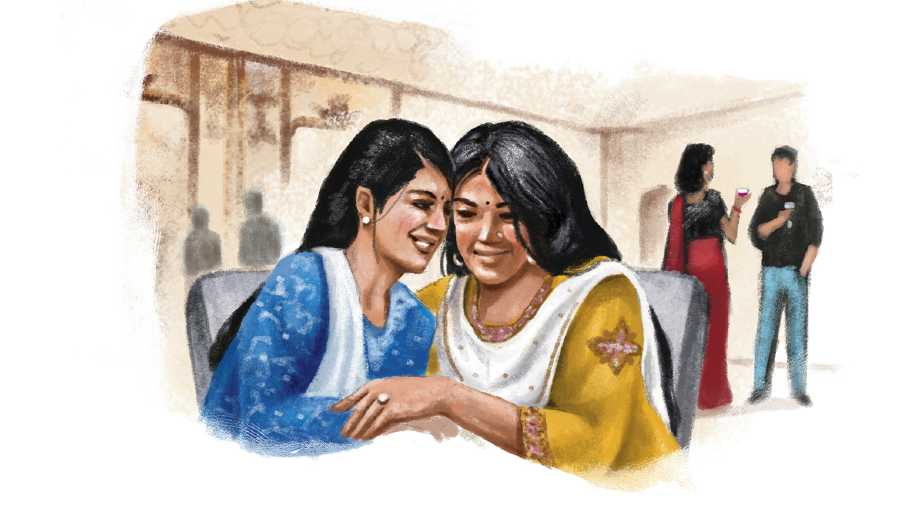Recap: A week after Maahir Kumar’s death, Raahi Pandit and her two daughters have a party in London to remember the actor. And, for the first time, Raahi gets recognition as Maahir’s wife.
“That was beautiful, mamma” Zaara gushed. Her nose was pink from crying. “If Baba had heard you he’d have teared up too.”
“If Baba had heard her he would have used the speech as a monologue in some film for the masses,” Seher said wryly, sipping her wine. Unlike her more emotional mother and sister, Seher was harbouring no delusions about Maahir’s sentimentality. Her father was a businessman first. He snapped up any object in which he recognised some value to himself.
It was the reason he snapped up Raahi Pandit, their gorgeous mother, almost as soon as he laid eyes on her. She was the electric new girl on the cinema block. Her youth would extend the twilight of his long acting career and stave off the younger heroes for a while. It was also the reason Maahir never broke his connection with his rich, well-connected wife, even though she was rumoured to be driven quite mad by his faithlessness.
But Seher would never say any of this to Raahi or Zaara. Especially not at the party celebrating her father’s life, when they were both laugh-crying and clinging to each other, both heady at being the favourites of Maahir Kumar and heartbroken at his horribly unexpected death.
“I think he did hear us, my loves,” Raahi said as she caressed the faces of her two daughters, always a little struck by gratitude when she was near them. “And he watches us now and takes part in all our little joys and sorrows. So we must make sure to give him a good show, alright? We must stay upbeat and keep looking forward to the future.”
Raahi’s voice broke under the weight of her emotion. She was unable, really, to imagine a future without Maahir. Zaara kissed her mother’s cheek in eager consolation. Seher did too, but with less enthusiasm. She knew that her father was shrewd enough to know all their hearts for what they were. And if he was watching now, he would know that it wasn’t for his sake but her mother’s that Seher promised to look forward to the future.
She had stopped doing things for her father’s sake the minute he had refused to marry Raahi or legally adopt Seher when they were still living in Bombay. She didn’t think of her father moving them all to the UK, to their fantastically luxe life in London as benevolent, but as a convenient escape for himself from his responsibilities. While Seher was aware of the great privilege she enjoyed at his expense, she was equally aware of how dependent they were on a man who had another, more legitimate family.
“Ma,” she said, trying to control the urgency of her tone, “have you returned Mr Bhatia’s phone call?”
Raahi frowned. “Seher beta, must we talk of lawyers right now?”
She said ‘lawyers’ the way most people would have said leeches. Seher didn’t blame her. Mr Bhatia, on his rare visits to London on business for Maahir, had always treated the Pandit women as though they were lepers, refusing to even drink a glass of water in their house. It was obvious that he, like most people in Bombay, were on Team Aparna.
That was why at this crucial moment, Seher thought it important that every necessary attention be paid to the lawyer.
“Mamma, I’m sorry, but we do have to speak of it now,” Seher insisted, “Bhatia is most likely calling about Baba’s will...”
“Seher!” Zaara exclaimed, blowing her pink nose on her cocktail napkin, “How can you think of money at a time like this?!”
Fresh tears came to Zaara’s eyes and Seher quieted down, suppressing a smile. Zaara had returned that summer, after four years of studying dramatic literature at an incredibly expensive American college, spouting that ‘Money was the Root of All Evil’. Obviously now, her twin passions — drama and equality — had been hurt by Seher’s commonsensical question.
“Zaara,” Seher said as gently as she could manage, “none of us have jobs. We have to find out what provisions Baba has made for us in his will. It will affect our entire future.”
At the mention of the word jobs, Zaara’s expression contorted in horror. She had spent most of her life, when she wasn’t in school, flitting from one country in Europe to another, soaking up the sun, the renaissance cultures and reading poetry. The idea of working for someone else... like... actually working for someone else... completely quieted her down.
“Oh Seher,” Raahi laughed and shook her head. “You’re too dramatic sweetheart. It’s never going to come to that! I am the COO of Kumar Productions, you know. We do receive a monthly stipend from them.”
“Baba authorised that, mamma.”
“Exactly!”
“He is no longer here.”
Raahi clicked her tongue dismissively at her worry-wart of a daughter, feeling a pin-prick of guilt as she did. Being bullied by her classmates in Bombay had made it impossible for Seher to ever feel secure where Maahir was concerned, even if she pretended to be long past it.
“Alright... I promise I’ll give Bhatia a call first thing tomorrow morning. Okay?”
“Why not tonight?”
“We’re having a party tonight dear!”
“After the party,” Seher urged. “I’ll take care of wrapping it up and saying goodbye to everyone.”
“But you hate playing hostess,” Raahi said, amazed. Seher wouldn’t even be here, around these many people, if Raahi hadn’t insisted.
“I’ll help her,” Zaara offered, slipping her hand into her big sister’s. Clearly she had been seriously affected by the thought of having to work at a job.
“Alright, alright,” Raahi said, shaking her head. “I’ll call that awful man as soon as it’s evening in India. I don’t want his whole office listening in. Especially not that horrid half-brother of yours.”
Seher and Zaara both kissed her cheeks, the first in gratitude, the second in relief. Raahi went off to enjoy the last party she would have for a long while.
(To be continued)
This is the second episode of Riva Razdan’s serialised novel Nonsense and Respectability. It will be published every Sunday.

Riva Razdan is a New York University graduate and currently working as a screenwriter and author based in Mumbai. Her debut novel Arzu was published by Hachette India in 2021











